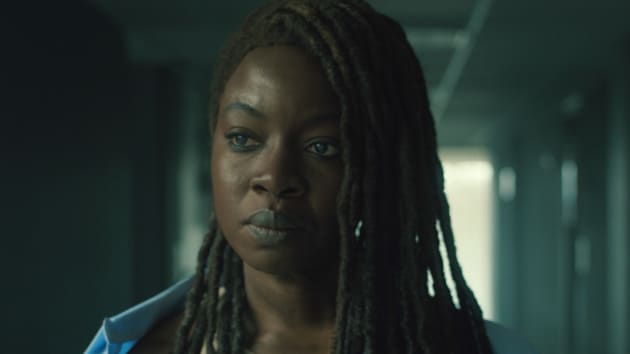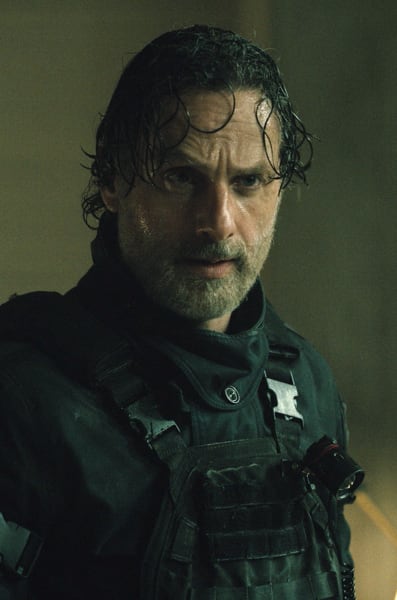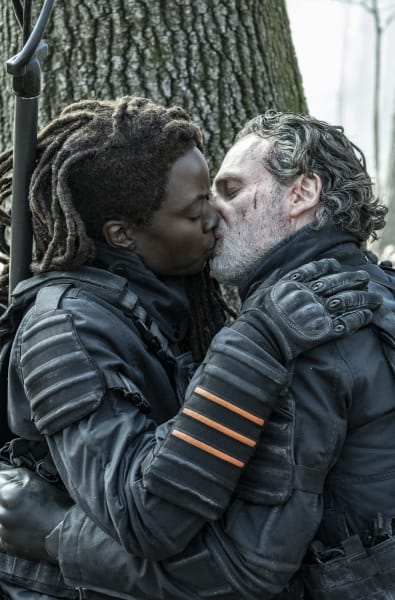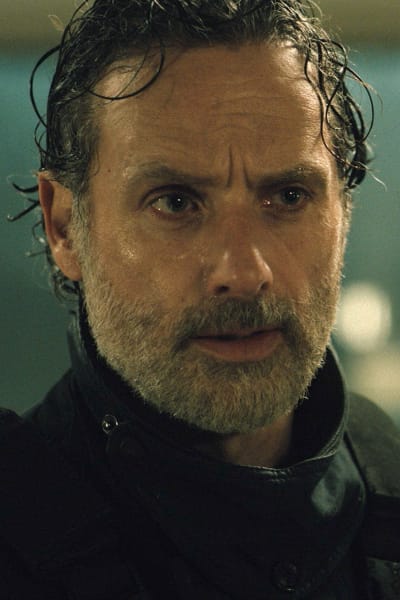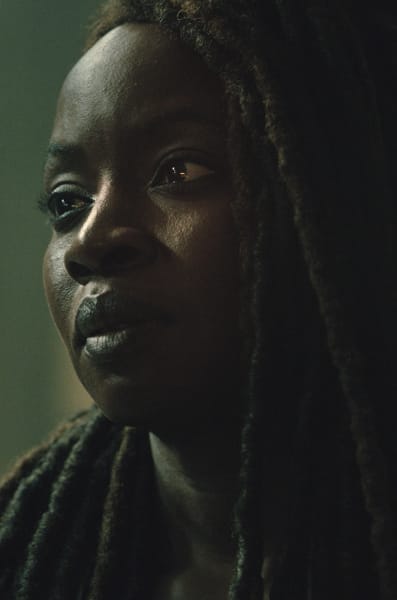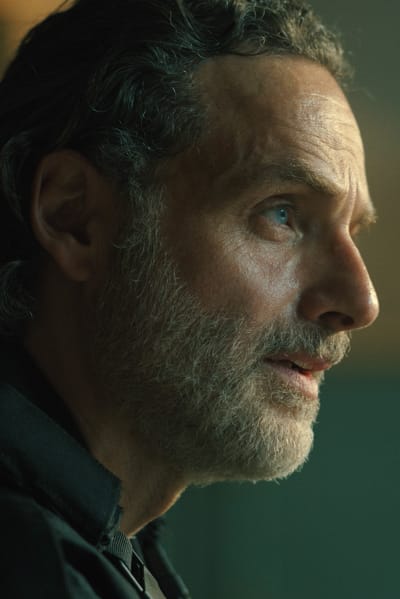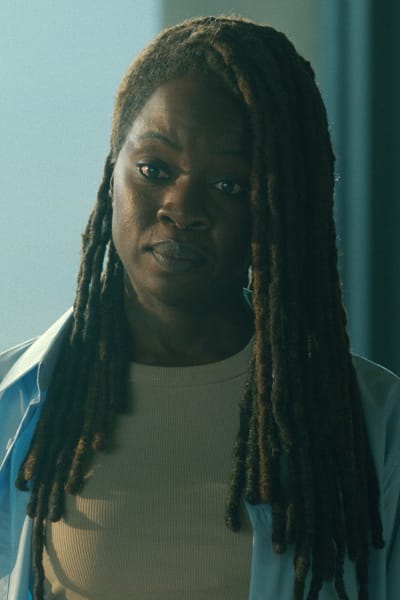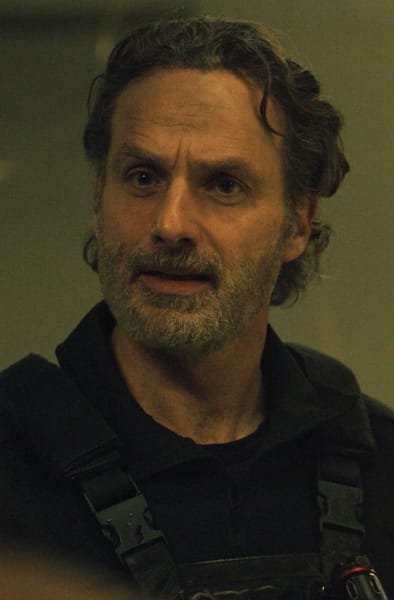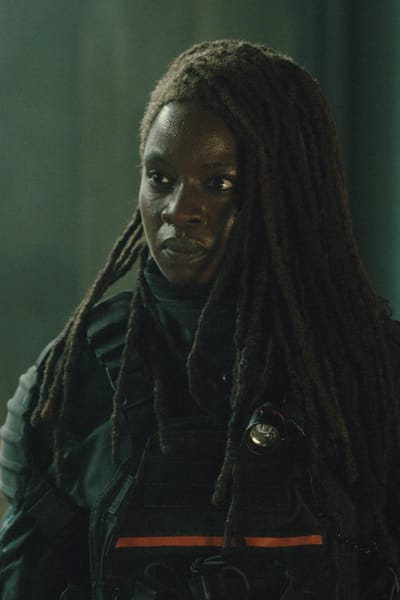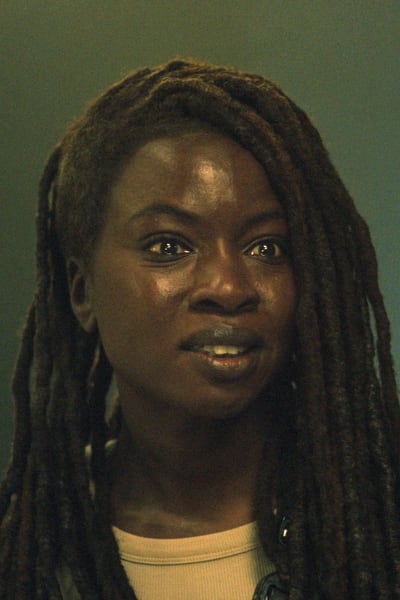When you finish a captivating episode of television, after you take a deep breath, often you want to go right back and relive some of the magic you just witnessed.
The Walking Dead: The Ones Who Live Season 1 Episode 4 is that hour, a magical affair between two stalwart characters in the beloved franchise, slowly breaking your heart and then putting it back together.
The episode is directed by the effortlessly charismatic Michael Slovis, who was nice enough to speak with TV Fanatic about the massive episode.
Slovis was not only kind and detailed in his responses but also incredibly knowledgeable and the perfect person to break down the ins and outs of such a pivotal piece of the story.
It was such an honor to get some time with Slovis, and it’s a conversation every diehard Walking Dead fan should check out.
What kind of prep are you doing when you’re going into an episode as a director? And especially for an episode like this, which is of such a high magnitude?
Whitney, we only have 15 minutes, and I talk about this for hours ad nauseam to schools.
But the most important thing to me is to determine, and it sounds easy, it’s like learning the basic moves in chess or checkers, but then playing the game, which is completely different, right?
For me, it’s determining what is the story about, and how do I advance the story.
Anytime I get stuck on the set with either a performance or a shot or something, I revert back to, “What is the story that we’re trying to tell at this moment? How does it advance the story within the act, the scene, the episode, and then ultimately within the structure of the entire series?”
For me to distill down what the story is, that is the most important part. Because I come from photography, the actual shots come organically, but I do it through character. I do it through what part of the story are we telling at that moment.
And that goes for something as performance-driven as this episode, or if it’s a short or even something with a lot of action. I need to know what the story is.
A perfect example is at the end of that episode, where they’re running, and they finally…they kiss in episode three, right? The one that precedes that sets us up. Trying to figure out what happened at that breach was really important to me because I knew it was the setup for episode four.
The episode hits on so many different beats. There’s the drama; there’s angst; there’s romance; there’s a little bit of comedy, back and forth, and all around. How do you make sure that the scenes reflect what you’re getting in the script?
It’s a great question, and I’m glad you brought up the comedy because that’s been a hallmark of The Walking Dead since it started. It’s not slapstick, ha-ha comedy.
It’s familiar smile comedy, which I think is one of the things that made it such an attractive show because we could all see ourselves in these situations with the tragedy and all the things that are going on.
With this episode specifically, I have to say that it really was all three of us always working and asking.
And because Danai wrote this beautiful script and knew it inside, outside, had reworked it, worked it, reworked it, taking the notes from Scott, I guess, and from everywhere where they come from, the network and whatever, and so she knew it like the back of her hand because it had emerged from her.
I had the unique fortune of having somebody who knew the entire genesis of the show right there with me. And so I just asked, to be honest, and we talked about it. And she was so amazing, wonderful, and open that it never was dogmatic. It always was a conversation.
That’s nice. And I could be way off base here. I could be overthinking it. But when I was watching it, the vibe that I was getting from that apartment complex felt like the relationship between Rick and Michonne.
It was kind of high-tech and cool, and then it started to crumble, encompassing where they were in their relationship at that time. They had to make a move, or they were going to go down. What kind of vibe were you hoping to achieve with the whole setup of that apartment?
Right. You just answered your own question. To be totally honest, Whitney, you got it, and you weren’t overthinking it, especially the design of that apartment. And by the way, that’s a good example of the humor, right?
The voice saying, “You’ve achieved the desired temperature or whatever.” It’s not like breakout laughing, slapstick funny, but it’s like, “I get it. I get where it’s all adding up to.”
The design of that apartment was tough and challenging. And because you are right, it was really a capsule. If you will, it was a canvas for their relationship. How were we going to paint it onto this canvas? And it can’t just be something that’s innocuous or not helpful to telling the story.
We worked a lot on the design of it and what we could do. And when you say design, you can’t literally go out and design your dream set because you have the reality of budgets and schedules, and space was a big issue.
Could it fit in where we were putting it? So, all of those things had to be factored in.
And so it went through a process. We talked about the story. I looked at it, and I have this thing that I do where I literally sit at my desk, look at the script, close my eyes, imagine the set, and imagine the people moving through it. And so we came up with proposals.
We knew that that window was very important, that great big picture window, was an important window to the outside. I knew the helicopter was coming in. We knew it was the lake outside, so we had the green screen or the backdrop; it’s actually a backdrop out there for much of it.
Some of it was a green screen or a blue screen.
We had limits on how big we could go and all that stuff. So, to a certain degree, we had to work backward from that view. Then it was, “Where does the story want us to be?” I knew I wanted a big room because, with all of the dialogue, we needed places for Andy and Danai to move if they so desired.
So, that whole first rounding, rounding around the table and around and all that stuff, was something I encouraged when we got there. I’m a big “There are no mistakes” person. I really like to get there.
And my process is we get there, we read the words, and then we just throw them in, and I’ll start with something humorous or to break the ice, I’ll go, “Let me impart the vision on you that I have in my head, the perfect movie,” which you never get, but you start here and maybe then see where it takes you.
And then I call myself a nudger because if they go there a little bit, I’ll say, “Maybe a little further, maybe a little left.”
And because of my background in camera, I’m always thinking about how I am putting it together, where they move. And Andy and Danai are such professionals and have done this for so long.
I can say something to them that’s a mixture of story and pragmatism, “If you don’t go this way and if you go that way, it will make our day. That way and not this way.” This gets a little tough, but I never do it to always be easy, to make it easy on me. I do it because it tells the story properly.
And I’m looking at the entire day.
Working on an episode like this, you’re primarily working with just two actors, and there are some scenes with walkers, but it may be easier thinking from the outside like, “Oh, it must be easier. You don’t have to worry about so many moving parts and different people.”
But I have to imagine it’s also challenging to have just the two actors. What was it like working with Andy and Danai for most of that episode?
Well, first of all, any two other actors, I’d probably still be shooting it, but these two, who knew their characters so well and are so skilled and so trusting of each other, and then in bringing me into their fold, it was really interesting.
And it was an honor to be there to see it as it evolved.
And I started off thinking, indeed, it was a two-hander, but I’ve come to the conclusion that it’s really a three-hander because I think that space was a character in the show, and it needed to be. And because of the way that we ended up building that space and designing it, it helped the story get told.
How did this episode help set up the rest of the season? It’s that midway-ish point.
I look at this as the fulcrum point of the story, if you know what I mean. To me, they have to get by.
That’s what Danai always intended this episode to be. We have to get through that point. Whitney, she says it. She says it when they’re in that bed, and he’s standing by the side of the bed, and she goes, “We’re not going anywhere until we get past this moment.”
Which is so familiar to anybody who’s been in love or in a relationship or in a friendship or as a parent or anything, that has somebody that you care about, “We need to deal with this now in order to move forward.”
And I always looked at that moment as the breakout moment, which is why I came up with the idea when they go out into the hall.
I went to the stunt coordinators and the fight coordinator and said, “What I want to do is I want to do a single shot of them coming down the hall, fighting in sync, and helping each other.”
If you look at that piece where, after they break out to the hall and after they’ve resolved, at least started to resolve their relationship, it’s just a single shot of them. We just moved the camera and they did a dance, a little pas de deux, the two of them, which was very important to me structurally.
***This interview has been edited for length and clarity.***
The Walking Dead: The Ones Who Live airs on Sundays on AMC at 9/8c.
Whitney Evans is a senior staff writer for TV Fanatic. She is a lover of all things TV. Follow her on X.
